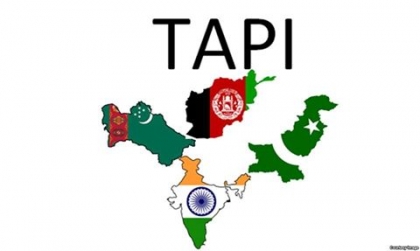Pakistan’s Upcoming Govt. To Start Laying TAPI Pipeline
Sun 05 Aug 2018, 15:04:11

The incoming government of Pakistan led by Tehreek-e-Insaf (TI) will kick off construction work on the $10 billion Turkmenistan-Afghanistan-Pakistan-India (TAPI) gas pipeline project, in a bid to cope with the daunting challenge of energy shortage. Former prime minister of Pakistan Shahid Khaqan Abbasi had participated in the groundbreaking ceremonies held to begin construction of the pipeline in Turkmenistan and Afghanistan. The 1,800 kilometers Turkmenistan-Afghanistan-Pakistan-India (TAPI) gas pipeline will feed three energy starved Afghanistan, Pakistan and India for 30 years. Officials say the pipeline will supply up to 33 billion cubic meters (bcm) of natural gas a year from Turkmenistan to Afghanistan, Pakistan and India for three decades. Pakistan and India will receive 42 percent share each, with 12 percent going to Afghanistan. In Pakistan, the work was scheduled to commence in May this year, but the plan could not be pushed ahead as tenure of the Pakistan Muslim League-Nawaz (PML-N) government was going to end on May 31, 2018 according to Pakistan’s Express Tribune. “Now, the new elected administration of PTI will start laying the
TAPI gas pipeline in Pakistan” a senior Pakistani government official told the paper. Pakistani’s State-run Inter State Gas Systems (ISGS) Managing Director MobinSaulat told the Express Tribuen that the pipeline construction had begun in Afghanistan and Turkmenistan. However, work had not yet been undertaken in Pakistan, he said, voicing hope that the incoming government would inaugurate the building of the gas pipeline. The project was targeted to be completed in 2021, but under the alternative plan, the participating countries would be able to complete it in 2020. The TAPI steering committee comprising ministers of the four countries has approved the alternative plan. Turkmenistan has huge gas reserves and a major chunk of them has gone to Russia that supplies the energy onwards to Europe. Turkmenistan has also been supplying gas to Iran whereas Afghanistan, Pakistan and India will be its new markets. Turkmenistan will bear 85% of the $10 billion pipeline cost while Afghanistan, Pakistan and India will have 5% equity share each. The pipeline cost is in addition to the $15 billion capital injection required for developing a relevant gas field.
TAPI gas pipeline in Pakistan” a senior Pakistani government official told the paper. Pakistani’s State-run Inter State Gas Systems (ISGS) Managing Director MobinSaulat told the Express Tribuen that the pipeline construction had begun in Afghanistan and Turkmenistan. However, work had not yet been undertaken in Pakistan, he said, voicing hope that the incoming government would inaugurate the building of the gas pipeline. The project was targeted to be completed in 2021, but under the alternative plan, the participating countries would be able to complete it in 2020. The TAPI steering committee comprising ministers of the four countries has approved the alternative plan. Turkmenistan has huge gas reserves and a major chunk of them has gone to Russia that supplies the energy onwards to Europe. Turkmenistan has also been supplying gas to Iran whereas Afghanistan, Pakistan and India will be its new markets. Turkmenistan will bear 85% of the $10 billion pipeline cost while Afghanistan, Pakistan and India will have 5% equity share each. The pipeline cost is in addition to the $15 billion capital injection required for developing a relevant gas field.
No Comments For This Post, Be first to write a Comment.
Most viewed from International
Most viewed from World
AIMIM News
Latest Urdu News
Most Viewed
May 26, 2020
Do you think Canada-India relations will improve under New PM Mark Carney?
Latest Videos View All
Like Us
Home
About Us
Advertise With Us
All Polls
Epaper Archives
Privacy Policy
Contact Us
Download Etemaad App
© 2025 Etemaad Daily News, All Rights Reserved.

.jpg)
.jpg)
.jpg)






.jpg)


.jpg)
.jpg)
.jpg)
.jpg)
.jpg)
.jpg)
.jpg)
.jpg)
.jpg)
.jpg)
.jpg)
.jpg)

















